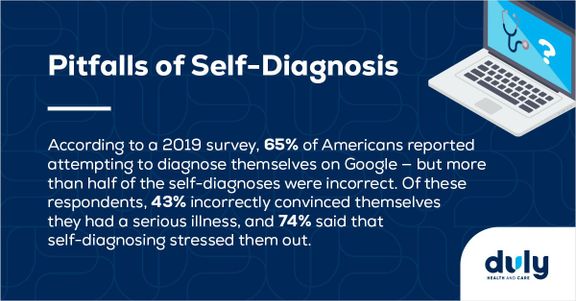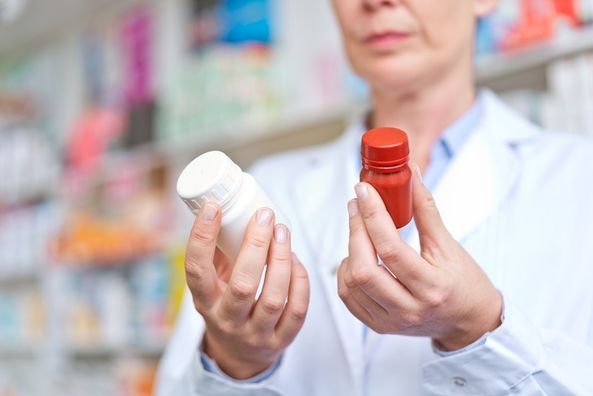Raise your hand if you’ve ever Googled causes for a headache, gone down a rabbit hole, and determined that you have a rare disease that will most likely kill you within 24 hours.
Now raise your hand if you have ever had every symptom under the sun — but didn’t have the time to deal with it — so you convinced yourself that it’s “not really that bad.”
(Hands down now).
While it’s normal to fall into the trap of trying to diagnose yourself, it truly is just that: a trap.
Here are 5 reasons why it’s a much better idea to consult an actual doctor instead of Dr. Google:
1. You Might Misdiagnose Yourself — And Work Yourself Into a Panic.
Let’s revisit that first scenario where you’ve decided that that minor headache will probably be the beginning of the end.
It’s true that a headache could be a sign of something more sinister, like bleeding in the brain (which affects approximately 23 out of every 100,000 people in the US each year). But a minor headache is probably more likely to be a tension headache (the most common type of headache, affecting 2 out of 3 adults), which isn’t associated with brain disease.
It’s a similar situation for symptoms like the occasional sore throat or a low-grade fever, which can often be chalked up to minor illnesses such as a common cold or seasonal allergies.
If you constantly convince yourself that your stuffy nose is the start of your imminent demise, you might wind up working yourself into a panic. And for some people, that anxiety could be the start of a vicious cycle — the anxiety manifests physically, which makes you more anxious, which brings on more symptoms.

According to a 2019 survey, 65% of Americans reported attempting to diagnose themselves on Google — but more than half of the self-diagnoses were incorrect. Of these respondents, 43% incorrectly convinced themselves they had a serious illness, and 74% said that self-diagnosing stressed them out.
2. Or, You Might Not Get Diagnosed at All.
Now let’s revisit scenario #2: You don’t want to admit that you’re sick, so you just keep chugging along like nothing is wrong.
Unfortunately, this can mean missing the memo that there actually is something happening that needs medical attention.
In some instances, that might mean that you don’t stay in and get the rest you need, which could make you feel even worse or expose others to a contagious illness.
In more serious cases, ignoring symptoms for long enough could have serious consequences. For example, if you notice a lump in your breast, it’s critical to have your provider check it out right away. It could be a sign of cancer, and it’s best to diagnose it as early as possible, since cancer found in its earliest stages is easier to treat.
If you’re concerned about being sick, or have been experiencing new symptoms, make an appointment with a Duly Health and Care primary care provider.
3. You Might Give Yourself the Wrong Treatment Plan.
The internet is full of people who have seemingly magical remedies for ailments ranging from mosquito bites to COVID-19, or who promise that a daily spoonful of honey cures chronic headaches. But unless a medication is prescribed by your provider or an over-the-counter treatment has been approved for use by the US Food and Drug Administration (FDA), it’s not certain to work — and it could even be dangerous.
For instance, you may have heard that taking aspirin every day prevents heart attacks. However, taking aspirin daily when it hasn’t been prescribed to you increases your risk for complications like bleeding in your stomach or your brain.
4. Or You Might Give Yourself the Wrong Wellness Plan.
Or, you may be tempted to load up on supplements like vitamins to boost your overall health. But certain supplements — especially if taken in high doses or along with other supplements — can actually be harmful. For example, getting too much vitamin A can cause liver damage. Taking vitamin C or vitamin E supplements can reduce the effectiveness of certain cancer chemotherapy treatments.
Your provider may prescribe supplements if you have a deficiency but let them make that call.
Also read, Which Primary Care Doctor is best for me?
5. And You Might Be the Victim of Medical Misinformation.
This is especially true if you rely on social media for learning about health.
Recently, the issue of teenagers using Tik Tok for mental health information has taken the spotlight. The hashtag “#mentalhealth” is popular on Tik Tok, with videos tagged with the hashtag accumulating more than 88 billion views (as of June 2023). Many of the videos are from people sharing their personal experiences, and not from healthcare professionals — and these videos are often laden with misinformation. Teens are using this information to make incorrect self-diagnoses and are even believing Tik Tok influencers over their own providers.
Even if you only stick to reputable sites with accurate information, like the Centers for Disease Control and Prevention (CDC), you could easily misdiagnose or mistreat yourself. Diagnoses and treatments rely on factors like your medical history, not just a list of symptoms, and the internet doesn’t have the context or experience to make an individual’s diagnosis.
This doesn’t mean the internet is always unreliable — it’s a great way to read up on a medical condition to get the basics or to connect with others going through something similar so that you don’t feel alone. But sticking solely to the internet rather than visiting your provider is risky.
There Is Good News
While it’s important to avoid self-diagnosis and self-treatment, it’s also important to embrace self-awareness. You know your body — if something feels wrong or is making you worried, listen to your instincts and don’t ignore your symptoms.
And then, call your provider. Not a search engine.
Health Topics:








